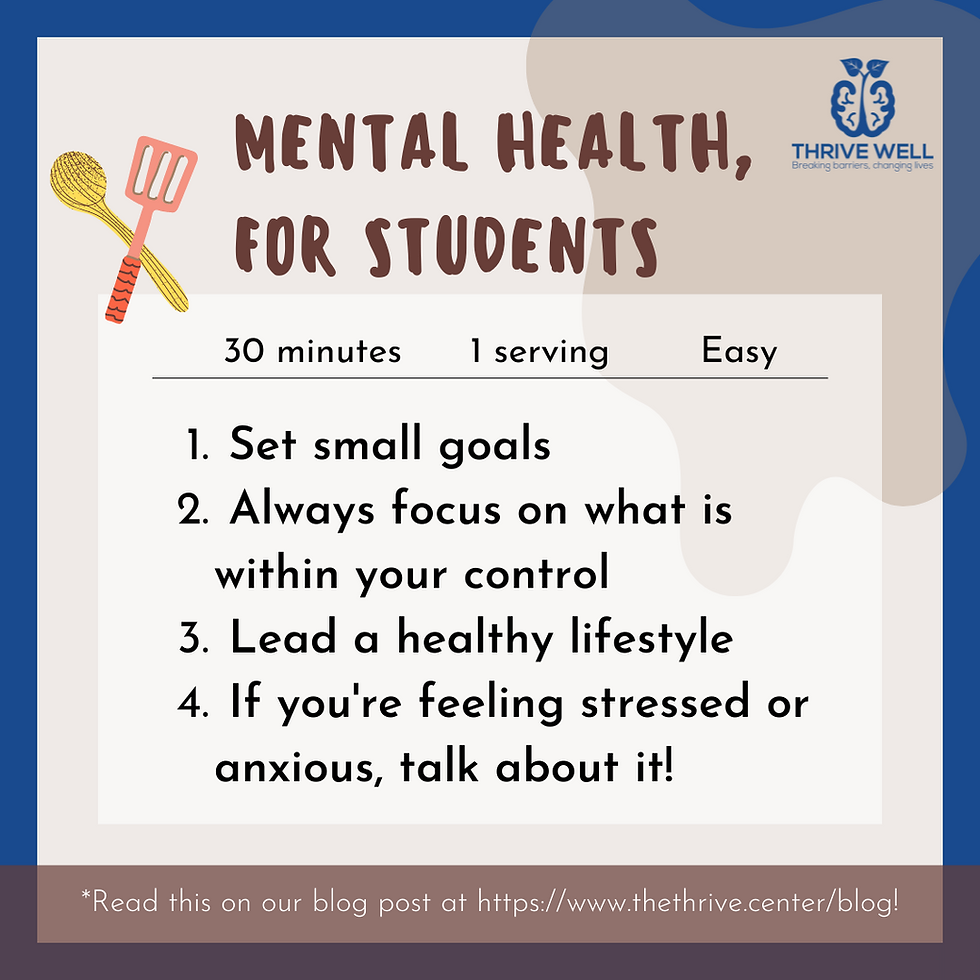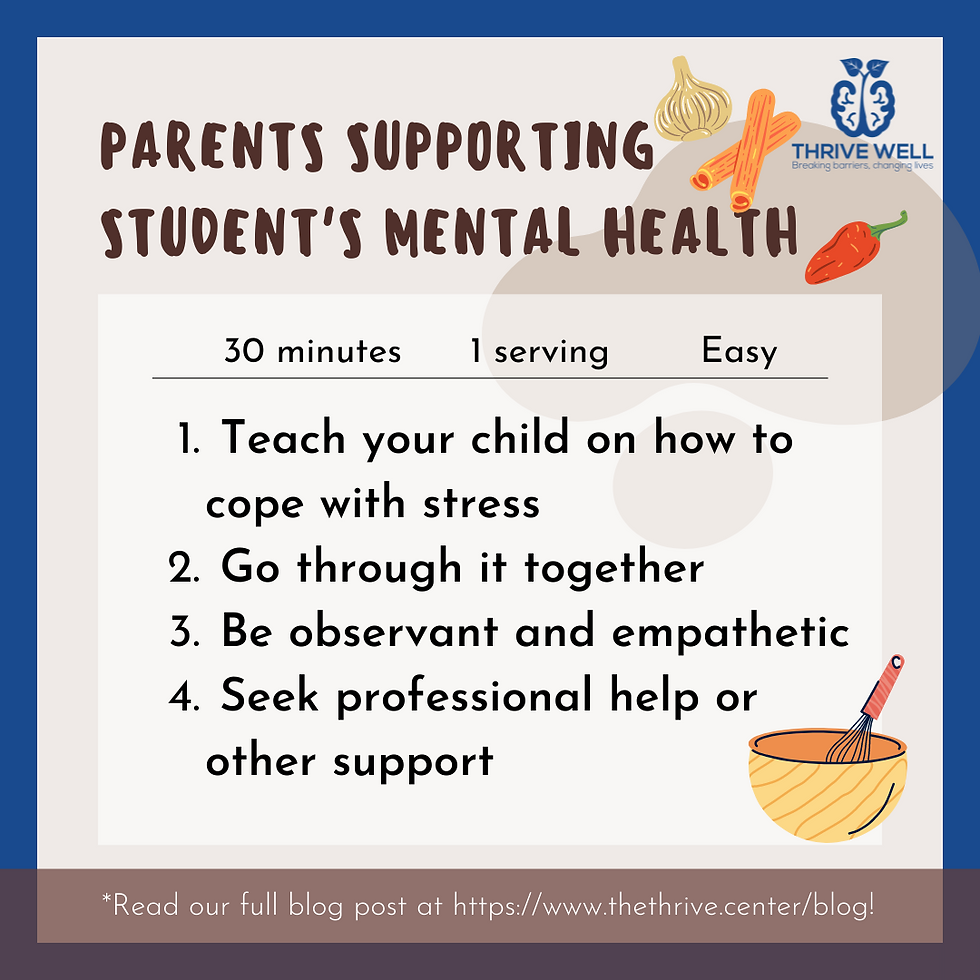Recipe: How To Care For Student’s Mental Health
- Thrive Well

- Mar 29, 2022
- 4 min read
Author: Ho Shu Xin
Goodbye SPM! Now, what are your plans for the break? Whether it is to binge-watch Netflix, or to get an internship — this recipe serves as the perfect guide for you to care for your (or your child’s) mental health in the post-SPM days.
🕒 30 minutes from prep to serve
🥗 1 serving
👨🏻🍳 Easy
What You Will Need (for students):

1. Set small goals
Make your to-do list achievable and realistic, no matter how small the tasks may seem. Don’t push yourself too hard.
Whether it’s tidying your room or reading a page of the book you always wanted to, all the small wins matter and take you one step further than before.
Use this break time to reflect on your achievements so far. Motivate yourself and be proud of how far you’ve come.
This is also the perfect timing for you to find your passion; try taking an online course on programming, volunteering as a part-time tutor, or exploring a new hobby such as baking — you might find your dream course of study or dream job from there!
Still feeling unsure about your next steps? Make a career assessment appointment with us! Get professional support and advice on career choices that best suit your strength. Register now at https://www.thethrive.center/career-guidance
Special ingredients: 1 teaspoon of kindness to yourself
2. Always focus on what is within your control
When you focus on what you can control, your thoughts empower you and then trigger positive emotions.
Within your control are your own opinions, attitudes, aspirations, dreams, desires, and goals. You control how you spend your time, what books you consume, how productive you are, the number of hours you choose to sleep, and who you choose to spend time with.
Outside your control sits everything else: the family and body you were born into, how the pandemic affected SPM and delayed your entrance to college, the weather, other people…

3. Lead a healthy lifestyle
Some light exercise for 20 minutes a day is key to helping with low moods, even if it’s just walking around your housing area!
Go to bed and wake up at similar times every day. If you’re struggling to switch off, try listening to something calm to send you to sleep. Do not touch your phone or other devices at least 30 minutes before going to bed.
Stick to a diet of healthy food. It will set you up for fewer mood fluctuations, an overall happier outlook and an improved ability to focus.
Special ingredients: 1 cup of discipline
4. If you're feeling stressed or anxious, talk about it
With the pressures of waiting for your SPM results, deciding on what and where to study, and applying for scholarships, they can be a lot to handle — but remember, it’s completely natural to feel apprehensive.
If you do find yourself feeling stressed or anxious, talk to someone, whether it’s a friend, family member or a teacher.
You can start with “I’m feeling quite stressed about (what you’re going through)”, “I feel overwhelmed by (what you’re going through)”, “I’m finding it difficult to cope with (what you’re going through)”.
Special ingredients: 1 jar of self-acceptance
What You Will Need (for parents):

1. Teach your child on how to cope with stress
Guide your child on how to apply a range of coping strategies into daily life. Some examples include breaking problems down to be more manageable and teaching about the importance of reaching out for help.
It's important to also be patient, and realise that while some techniques work for you, it might not work for you child. It's good to discuss and encourage them to open up. Ask them what support they need.
Special ingredient: 1 bowl of patience
2. Go through it together
Taking care of yourself is equally important because it models self-care.
Establish self-care routines together at home. Take time to enjoy hobbies and relax. A daily emotions check-in might do some good too.
Your stress can affect your child's stress level too. It's okay to be honest with each other about how you’re feeling and try to figure out how to cope together.
Special ingredient: 1 ladle of love and care
3. Be observant and empathetic
While it’s common to see your child dealing with stress, you may not always realise when there’s more at play.
It’s vital to be able to recognize possible signs of adolescent depression and anxiety to prevent your child’s mental health from worsening. Some signs include lost of interest in hobbies, changes in sleep patterns, low energy, and low motivation.
Try giving your child some space. If such signs persist or have worsen after 14 days, then take more steps and steer them towards help.
Let them know that it's okay to feel these feelings and you are there to support them. Make sure to actively listen to their concerns non-judgementally.
4. Seek professional help or other support
Reaching out for professional help or other support like religious groups is a sign of strength too. You have different options and avenues.
Special ingredient: 1 teaspoon of courage
Chef’s Tip:
Best consumed daily from today onwards. Remember, mental health should be a priority for all students — be it during the “stressed” season of SPM, or in your post-SPM pursuits. We at Thrive Well wish you all the best in your future endeavours!

Uncertain about your future? Schedule a career assessment with us today!
With the support of a mental health professional, career assessments allows you to better understand your interests and strengths, and how it may relate to potential career paths. It also allows you to identify ways on improving your abilities and chances for career opportunities of your interest.
Learn more and schedule an appointment with us today at: www.thethrive.center/registration
References:
https://www.bcu.ac.uk/health-sciences/, How To Look After Your Mental Health As A Student
https://www.omaritani.com/blog/, Learn To Focus On What Is Within Your Control
https://www.aetna.com/, Food Affects Mental Health
https://parentandteen.com/, Teen Mental Health Research




شيخ روحاني
رقم شيخ روحاني
الشيخ الروحاني
الشيخ الروحاني
شيخ روحاني سعودي
رقم شيخ روحاني
شيخ روحاني مضمون
Berlinintim
Berlin Intim
جلب الحبيب
https://www.eljnoub.com/
https://hurenberlin.com/